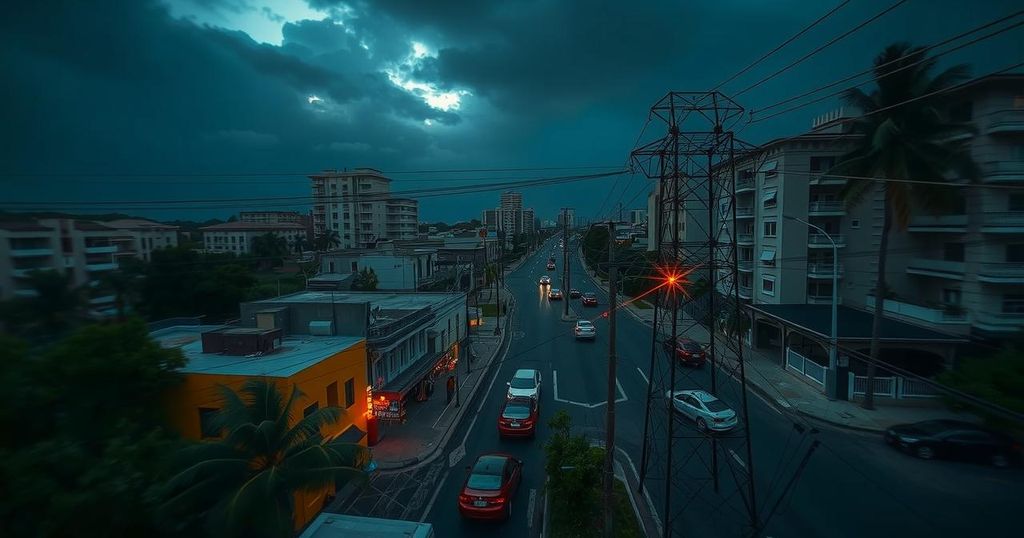Cuban Power Crisis Deepens Amid Blackouts and Approaching Hurricane Oscar

Cuba faces a third day without power due to failures in its electrical grid as Hurricane Oscar approaches, complicating recovery efforts. Millions remain affected, with officials struggling to restore service amidst heightened public distress and protests. The crisis is attributed to a combination of natural disasters, aging infrastructure, and economic sanctions.
Millions of Cubans have endured a third consecutive day without power due to failures in the nation’s electrical infrastructure. As reported by the Cuban Electrical Union, approximately 16% of the country had regained electricity before the aging energy grid succumbed to another overload late Saturday night. Amid all these outages, officials have not indicated when power will be fully restored. This outage marks the third significant collapse of Cuba’s energy grid since Friday, leaving the majority of the population of 10 million residents disconnected from electricity during this period. The situation is further complicated by the impending approach of Hurricane Oscar, which forecasters indicate will impact eastern Cuba with heavy winds and heightened surf conditions. The hurricane made its initial landfall on Inagua Island in the Bahamas, possessing maximum sustained winds estimated at 80 mph, according to the 5 a.m. EDT briefing from the National Hurricane Center on Sunday. It is anticipated that Hurricane Oscar will reach the northeastern coast of Cuba later in the day. “Weakening is expected after landfall, but Oscar could still be a tropical storm when it moves north of Cuba late Monday and across the central Bahamas on Tuesday,” stated the National Hurricane Center. The primary blackout occurred on Friday when one of the main power plants in Cuba failed, as confirmed by the energy ministry. Despite initial reports of a gradual restoration of power, the country faced a second nationwide outage on Saturday morning. These widespread blackouts pose a risk of exacerbating an already fragile situation in the country, where reliable electricity is essential for water supply and food preservation. In Havana, residents have been experiencing significant distress, with long queues forming at the few locations that are able to sell bread and other basic necessities. Frustrations have ignited as supplies deplete and some individuals feel overlooked during distribution. Many citizens have taken to social media platforms such as WhatsApp to share information regarding power outages and locate areas with electricity, while also managing logistics for preserving medications that require refrigeration. Some observers noted the contrast as tourists continue to roam the streets in vintage cars, although hotels have been seen to run out of fuel for generators. Reports indicate that Havana’s José Martí International Airport is operating under emergency power, leading to inconveniences such as non-functional printers and a lack of air conditioning. Additionally, Reuters documented a series of small protests erupting in response to the crises. Cuban officials have attributed the ongoing energy difficulties to a variety of factors, including U.S. economic sanctions, disruptions from prior hurricanes, and the country’s aged infrastructure. In a delayed televised address, Cuban Prime Minister Manuel Marrero Cruz articulated efforts to mitigate the crisis, sharing, “We have been paralyzing economic activity to generate (power) to the population.” Furthermore, Health Minister José Angel Portal Miranda confirmed that health facilities are operating on generators to provide essential services to the public.
Cuba has been grappling with recurrent energy crises exacerbated by the aging state of its electrical infrastructure and external pressures, including economic sanctions imposed by the United States. This recent blackout episode underscores the vulnerability of the country’s power systems, which have failed multiple times within short intervals. The impact of natural disasters, such as Hurricane Oscar, further threatens to destabilize an already precarious situation, raising significant concerns about public health and safety as much of the population becomes reliant on sporadic power sources for basic necessities. The interaction of these factors has triggered public discontent, reflecting growing frustrations regarding the government’s capacity to manage electricity supply and overall infrastructure resilience.
The recent power outages in Cuba have illuminated the fragile state of the nation’s electrical grid, suggesting a deep-rooted infrastructural crisis exacerbated by natural disasters and external sanctions. With Hurricane Oscar approaching, the challenges of power restoration and resource access become even more pronounced, highlighting the urgent need for systemic reforms in the energy sector and a reconsideration of international relations impacting Cuba’s resilience. The public’s response, marked by frustration and protests, reflects broader discontent with the current economic conditions and government management of essential services.
Original Source: www.cnn.com







